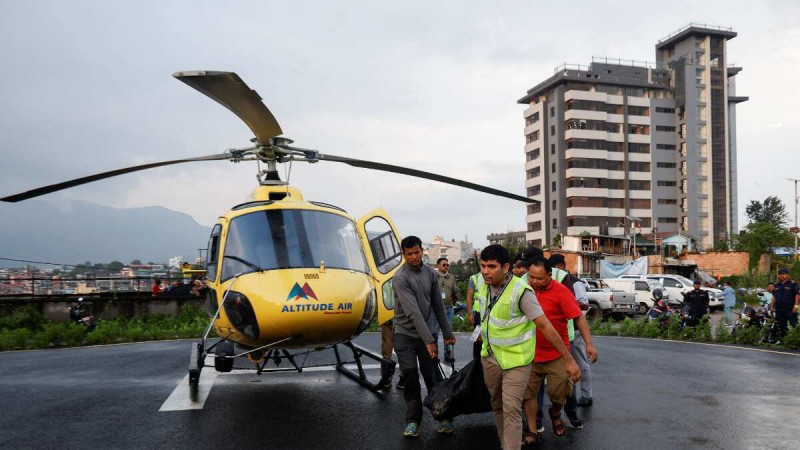
New Delhi: In the wake of a tragic helicopter crash that claimed several lives, the Nepalese government has issued a ban on "non-essential" helicopter flights. The decision, aimed at ensuring aviation safety and preventing further accidents, reflects the government's commitment to addressing concerns surrounding air travel in the country.
The ban comes after a recent helicopter crash in the mountainous region of Nepal resulted in the loss of several lives, including that of a prominent political figure. The incident raised concerns about the safety of helicopter operations and the need for stricter regulations to prevent such tragic accidents in the future.
Also read:Canada Reopens Talks with Turkey on Export Controls After NATO Deal
The Nepalese Civil Aviation Authority (CAA) has deemed it necessary to temporarily suspend "non-essential" helicopter flights until a comprehensive safety review is conducted. The ban includes tourist flights, recreational flights, and other non-essential helicopter operations that do not serve critical purposes such as emergency medical services, search and rescue, and transportation of essential supplies.
The move has been welcomed by aviation experts and safety advocates who have long highlighted the need for enhanced regulations and safety measures in Nepal's aviation sector. They argue that the ban on non-essential helicopter flights is a crucial step toward ensuring the safety and well-being of both passengers and crew.
Nepal, known for its rugged terrain and challenging weather conditions, poses unique challenges to helicopter operations. The country's mountainous landscapes and unpredictable weather patterns demand utmost caution and adherence to strict safety protocols. The ban serves as a proactive measure to address these challenges and prevent further accidents.
Also read:France to Agree on UPI System with India to Reach Global Market
The Nepalese government has also announced plans to conduct a thorough investigation into the recent helicopter crash to determine the cause and identify any lapses in safety procedures. The findings of the investigation will help shape future regulations and ensure the implementation of measures to prevent similar incidents.
As part of the ban, the CAA will collaborate with helicopter operators, industry experts, and stakeholders to develop comprehensive safety guidelines and regulations. These will include strict protocols for maintenance, pilot training, weather monitoring, and operational procedures to enhance safety standards in the industry.
The ban on non-essential helicopter flights is expected to have an impact on Nepal's tourism sector, which heavily relies on helicopter services to transport tourists to remote and inaccessible areas. However, the government has emphasized that safety remains a top priority and that measures will be taken to minimize the impact on tourism while ensuring the well-being of visitors.
Also read:Monsoon Devastates Northern India, Killing Over 100
Nepal's commitment to aviation safety and the implementation of stricter regulations is essential for the sustainable development of the country's tourism industry. The government aims to rebuild trust among tourists and aviation stakeholders by demonstrating its dedication to ensuring safe and secure air travel.
The ban on non-essential helicopter flights will remain in effect until the completion of the safety review and the implementation of enhanced safety measures. It is a temporary measure taken to address immediate concerns and pave the way for a safer and more secure aviation environment in Nepal.
Also read:During World War II, the British Secret Service's Unique Tactic: Fake Explosive Rat Corpses
In conclusion, Nepal's decision to ban non-essential helicopter flights in the aftermath of a deadly crash reflects the government's commitment to aviation safety and its determination to prevent further accidents. The move highlights the country's proactive approach to addressing concerns in the aviation sector and reinforces its dedication to protecting the lives of passengers and crew. As the government conducts a comprehensive safety review and introduces stricter regulations, Nepal aims to enhance the overall safety standards and rebuild trust in its aviation industry.